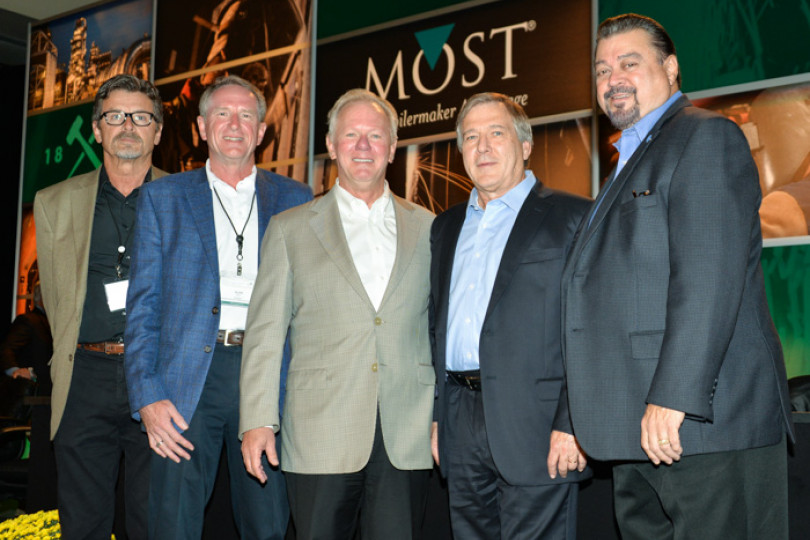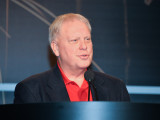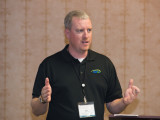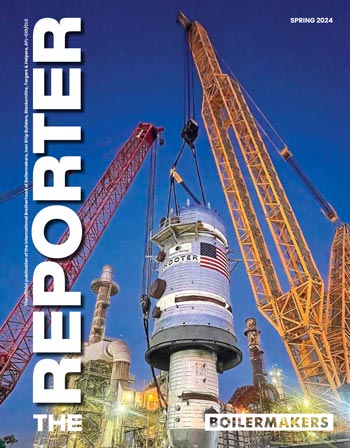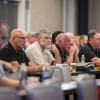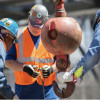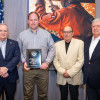I truly believe the Boilermakers are setting a standard that, if followed by the other craft unions, will allow the building trades to become the labor of choice throughout North America.
Tripartite partners share achievements in the Torrance Refinery turnaround. Left to right, AIP Jim Cooksey, Construction & Turnaround Services President Alan Black, IP Newton Jones, PBF Senior Vice President of Refining Herman Seedorf and IVP J. Tom Baca.
View Photo Gallery (5 photos)
Event brings together owners, contractors and union
PARTNERS IN THE MOST National Tripartite Alliance met at the 32nd annual conference in Myrtle Beach, South Carolina, Oct. 2-5 to identify opportunities and challenges in keeping with the alliance’s goals of problem solving and improving industry performance.
In his opening comments, International President Newton B. Jones praised tripartite-developed programs that save money, improve performance and reduce injuries. He spoke about major pressures on the industry, including climate change, shifts in fuel sources and environmental rules that have impacted energy markets and man-hours. Those changes, he said, will require reaching out to new markets and new industries to sustain the workforce. He urged contractors to aggressively pursue new work.
Jones discussed major initiatives in recruiting, training and organizing aimed at ensuring Boilermakers are ready and capable to staff owner projects. He also announced that Boilermaker Code training is now mandatory and that the union expects to have all field construction members trained on the Code within three years.
Jones emphasized that the Boilermakers are continuing to push for CCUS research, development and deployment as a solution to global carbon emissions and a necessity for the continued use of fossil fuels.
Speakers offer solutions to industry challenges
TRIPARTITE AND GUEST speakers discussed the current and upcoming challenges to the industry and offered solutions to issues facing the alliance.
NACBE Executive Director Ron Traxler reviewed the Boilermakers’ historical safety record as recorded by NACBE, observing an impressive trend in fewer injuries.
He said new recruiting and training initiatives will make contractors more cost competitive by providing safety-trained, drug-free, highly-skilled Boilermakers and that all tripartite partners have a vested interest in the outcome. “No matter what company, contractor, or owner you are representing, we are all on this path to succeed together.”
Stephen Lindauer, TAUC CEO and NMA Impartial Secretary/CEO, noted the decline of National Maintenance Agreement work since 2011 while offering hope for future job opportunities. He said the loss of man-hours is the result of various factors, most notably the decline of coal-fired power plants. Looking ahead, Lindauer said there are promising new opportunities for shale gas development in Pennsylvania and throughout the Ohio Valley which will require additional cracker units will be needed to process oil from fields like the Marcellus formation.
Shannon Angielski, Executive Director of the Carbon Utilization Research Council (CURC), provided an overview of the coal-fired power industry and the various factors that impact its future, such as competition from other fuel sources and public policy. She said CURC seeks to help reverse the trend of lost man-hours in the construction and maintenance of coal-fired plants by promoting CCUS technology development and more equitable government support such as tax credits to put coal generation on a more even footing with renewable energy.
Other speakers included MOST Administrator Dale “Skipper” Branscum, who gave an overview of MOST programs and reported progress being made with Boilermaker Code training. The majority of U.S. local lodges – 91 percent – have held Code training, he said, with over 20 percent of all Boilermakers voluntarily attending.
Mike Snowden, Bank of Labor Market President, discussed the decline of the Labor Movement and how the Bank of Labor is striving to help reverse the decline by aggregating labor’s money and financing union-built projects.
Charles Jones, Director of the Boilermaker History Preservation Department, offered a tribute to Boilermaker craftsmanship, showing three films produced by BHPD and created by Wide Awake Films.
Alliance partners recount Torrance Refinery success
OWNER, CONTRACTOR AND union presenters recounted a successful tripartite effort involving a shutdown of the PBF Energy refinery in Torrance, California. PBF, which purchased the refinery from ExxonMobil in 2015, needed to overhaul and update the facility, which had not been through a major turnaround in 25 years. To complicate the project, neither the PBF project leadership nor the building trades was familiar with the refinery. Moreover, the project was to become a test case for union crafts in California as the first major turnaround since the passage of SB54, a state law that requires at least 60 percent of journeymen working in refineries to have graduated from an approved apprenticeship training program.
PBF Senior Vice President of Refining Herman Seedorf stressed that IBB leadership made the turnaround’s success its primary mission, visiting the site often and communicating with tripartite partners frequently.
“I truly believe [the Boilermakers] are setting a standard that if followed by the other craft unions will allow the building trades to become the labor of choice throughout the country in North America,” Seedorf said.
J. Tom Baca, Western States International Vice President, praised the effort of California Locals 92 and 549 as well as the many Boilermaker travelers who brought their skills to the Torrance Refinery project.
“We had the best hands on this job,” said Baca.
International Rep Jim Cooksey recalled the four-year effort by the Boilermakers and other trades to help push SB54 through the legislative process and said the Torrance Refinery “is where we were to prove our mettle to the refiners.” He said the Boilermakers are already preparing for several more union turnarounds in the state.
Working groups outline initiatives
WORKING GROUPS ESTABLISHED last year reported their findings on human performance and developing work opportunities outside the energy industry.
The group on human performance was led by James Fitzgerald, Manager, Major Projects, First Energy, and Mark Garrett, MOST Safety Representative. Garrett explained elements of human performance such as “self-checking” and “peer-checking,” and related how many of these elements are incorporated in Boilermaker Code training modules. Garrett said MOST five-hour safety refresher training now incorporates human performance information, and the Boilermakers National Apprenticeship Program is considering such training for apprentices.
Developing work outside of the energy industry was the subject of the working group headed by committee chairman Richard Greenwell, Manager of Business Development, Sterling Boiler & Mechanical, and committee secretary Mike Murphy, SVP and General Manager for Nooter Construction. IBB and NACBE consultant Kim Flowers said the committee’s research and strategic planning efforts have narrowed the initial market focus to an area along the Texas Gulf Coast, where there is a considerable presence of petroleum refineries. Flowers stressed that recruiting and training initiatives will be critical in offering owners in the area a workforce that has the capacity, skills, competitive cost and availability to engage in the Texas refinery market.
Caucus breakouts set upcoming focus
CAUCUS BREAKOUTS, A staple of tripartite meetings, focused on three primary points of discussion: a zero-injury policy, MOST programs and relationship building.
Joe Hegendeffer, Maintenance Supervisor, KCP&L, and chairman of the owner caucus, said safety is at the forefront of importance to owners and that owners are committed to finding “new and innovative ways to make our worksites safer for all.”
Co-chairs of the contractor caucus were Michael Bray, VP and CEO, Shelby Mechanical, Inc., and Robert Gabrysiak, SVP, Hayes Mechanical. Concerning MOST programs, Bray said that Boilermakers excel in training and “continue to be the front runner in all the building trades.”
Mark Vandiver, Executive Director — Construction Sector Operations and chair of the Boilermakers caucus, said business managers have reported improvements in key areas such as a willingness from some owners to reschedule outages to accommodate manpower availability. Gabrysiak said having strong working relationships means the tripartite partners must communicate. “If we don’t communicate with each other, we fail.”

